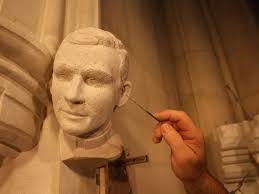I had planned to write an ongoing series of blog posts while on pilgrimage to mark the 50th anniversary of Jon's death in Hayneville, AL. It just wasn't possible, primarily due to fatigue. Walking, talking with many different people and a ton of mixed feelings bombarded me for the 2 1/2 weeks that we were gone.
There were little things like a savaged tire before we even arrived in Birmingham. Then there were the larger things, such as visiting with the survivors of Jon's death who had never quite all met together to process their feelings. It was such a combination of mixed emotions that it will take time for me to engage this 'happening' of events.
I am both grateful for the combination of events that Judy and I participated in throughout August but I am still mystified by the grief, anger and deep sadness that still hovers around the life and death of Jon Daniels.
Since Judy Upham, my spouse, was the companion of Jon in the spring of 1965 when they marched in Selma at the call of Dr. Martin Luther King, it was a foregone conclusion that we would mark the 50th anniversary. But due to a fall in January we were uncertain if we would be able to. Then we learned of a guided pilgrimage by our seminary to mark the 50th anniversary of Jon's martyrdom. It would begin Aug.12th in
Birmingham and end with an actual walking through the events in Hayneville, AL. Judy and I had wanted to ride on the bus with the rest of the pilgrims and initially we did; however logistics required that we drive part of the way so that when the pilgrimage was over we could drive back to Selma on Sunday to attend St. Paul's Episcopal Church, the parish that had initially denied entrance to the marchers in 1965.
In addition to the pilgrimage, Judy and I were invited to speak in Detroit as a way to mark the feast of Jon Daniels by a former classmate, the Rev. Ron Spann, at St. James, Grosse Pointe. And
we were also invited to the Jonathan Daniel Day celebration Aug. 21-24 in Keene, NH, Jon's hometown. We then flew back to Birmingham, picked up the car and drove home. All in all, it was a true saturation in the life, death and inspiration of Jonathan Daniels.
As with all spiritual journeys, pilgrimage is sacramental. The outward actions of movement are often the sign of something very powerful going on the soul, or whatever part of the human experience that is touched by the Holy. This was no mere aping of what the saint had done. This was the kind of transformative event that can be recognized as a 'mountain top experience', but without the euphoria. It was and still is, for me, a time in my life that will continue to demand my attention and my growth in so many different areas in my life. It touches the interior but it requires so much exterior change as well as interior change for me to find the balance that I know that God calls righteousness.
Now that I am released from the 'silence' that was demanded of me the past year by those frightened of the truth, I plan to write on the various points that touched me along the pilgrimage. They will range from Jim Crow to hummingbirds to white privilege. I will
group them under the heading of The Selma Tales not because they all have to do with Selma, AL but because they touch me because of Jon Daniels, Judy Upham, Ruby Sales, Richard Morrisroe, Gloria House and Jimmy Rogers, fellow pilgrims, the people of Keene, NH and some of the people of AL we met along the way.
Most of these points are as much of an attempt to process what has happened in my heart over the past month. Like all extroverts, I need to 'discuss' what I saw or felt to make them real for me. Some are incidents that need to be understood so I can let go of them.
Some are precious to be treasured. Richard Morrisroe, the Catholic priest who was shot with Jonathan made a statement that sticks with me: "I knew Jon for 9 days in life and for 50 years in death." It is true with me. I have known him for almost 40 years in death, but I have seen his life lived out in others and that is what sainthood is about. So I continue my pilgrimage, the same one that follows in the footsteps of Christ.
As I prepare to go on the Jonathan Daniels' 50th anniversary pilgrimage, I am pondering what martyrdom means. Throughout the history of Christianity we have had those who have 'died for their faith' or whose lives have been laid down for others because of their faith. Originally the term martus meant witness, but as the years after the death of Jesus, many who followed him were seen as those who threatened the control of the Imperium.
Saint Stephen is noted as the first Christian martyr (Acts 7ff). Stephen was fairly inflammatory in his preaching so it isn't surprising; however, the stoning of him did mark for the early followers of Christ's Way a powerful image of the cost of discipleship. The 2nd century was
filled with those who were willing to lay down their lives for the faith. The attitudes of Roman or even local rulers were that Christians were 'obnoxious' or rebellious. Christians were pacifists and refused to serve as conscripts in the Roman army. And they refused to worship the Roman gods which was considered treasonous. Just how destabilizing Christians were to the Roman Pax is questionable, but Christians were targeted and harassed the way that minority cultures or movements are today. That so many were martyred says more about the fear that permeated Roman imperial society than it did about Christian bravery.
Martyrdom is still known in Christianity. Even today, Christians
are being targeted and killed because of their faith. Well-lived Christian lives are still frightening to those who wish to control others. For many Christians the witness of those who have laid their lives down for others is still the 'seed of the Church".
It makes me deeply sad that in order to do good, or preach good, or to live the goodness of life in the name of Jesus is still grounds for people to kill. The need to kill those who are different is centered in the fear of those who are 'other'. The other sadness comes from those who
USE the word Christian to control others, and therefore negate the meaning of the cross.
I do not believe that the cross is the sign that demands suffering despite Gregory I. Nothing in the life of Christ teaches that we are to take on suffering as a way of faithful living. It is interesting that the cross does not become a symbol of Christianity until the 3rd or 4th century once the imperial powers have taken over the Church.

So what does it mean to 'pick up the cross and follow after me'? Does it mean that I am to try to emulate Christ in the way I am to die? No! It means that I need to be willing to live my life so freely and so lovingly that death has no power over me. It means that if I am asked for my life to save others, I can give it. But it does not mean that I am to go seek ways of giving up my life to emulate Jesus' death. 2 Cor. 6:2-10 speaks of the kind of integrity that life in Christ means--it is a kind of living that defies the critique that often happens to those who try to follow the Way of Jesus. For invariably, living the life of Christ mocks the status quo in societies in which there are classes, boast have/have nots societies, or those who rule over others.
In the particular martyrdom of Jon Daniels: he was not killed
 Martyrdom doesn't really make saints. God does that. But martyrdom makes a society question. The death of one who is willing to sacrifice his/her life because it can be lived freely is so awe-inspiring that it attracts the worn eyes of those bored by life caught up in meaninglessness. Jon's death captured the imagination of hearts that had grown tired of those who practiced a benign faith. It caught the attention of those in Northeast who had been blind to the plight of people in the South--
Blacks and Whites caught in an evil system. It was a system that masked the reality of humanity with layers of religious bias, socio-economic lies, historical jingoism and convenient anti-intellectualism.
Martyrdom doesn't really make saints. God does that. But martyrdom makes a society question. The death of one who is willing to sacrifice his/her life because it can be lived freely is so awe-inspiring that it attracts the worn eyes of those bored by life caught up in meaninglessness. Jon's death captured the imagination of hearts that had grown tired of those who practiced a benign faith. It caught the attention of those in Northeast who had been blind to the plight of people in the South--
Blacks and Whites caught in an evil system. It was a system that masked the reality of humanity with layers of religious bias, socio-economic lies, historical jingoism and convenient anti-intellectualism.
The witness of Jon's death brought a conscientiousness to the 'powers that be' at the time that brought legal changes for our nation. Is that what Jon and Judy Upham were doing in Selma? Or
was it just naivete? It might have been, but there is something about lives that are lived in the freedom of Christianity. They weren't thinking about their grade points when they responded to the call of Dr. King. They were living lives freed by their love for God that would allow them to help others know the freedoms they knew. They were supported by institutions that allowed them to act on their faith. And had grown up in families that engendered the kind of fairness that Jesus' life characterized. They had responded in a manner that changed their lives. And would change the lives of others.
Jon wasn't thinking when he pushed Ruby from the path of Tom Coleman's shotgun. He didn't have to. His faith was so integral to his living that it was 'natural' to do it. That is a saint! One who doesn't even have to think about laying down his life for another.
So martyrdom is not so much about the death of a saint. It is about the living of those who are willing to live with such abandon that they are not afraid of death, not afraid of what others think, not afraid of the cost. They live only in sight of God's love and that is enough.
Holy One, I do not believe that you have asked me to be a martyr, but you have invited me to live a life worthy of your calling. Grant that through the witness of others, I can keep the freedom you have wrought in me ever before me and allow me to continue to live in ways that can help others to know the joy that living in you means.
Amen
